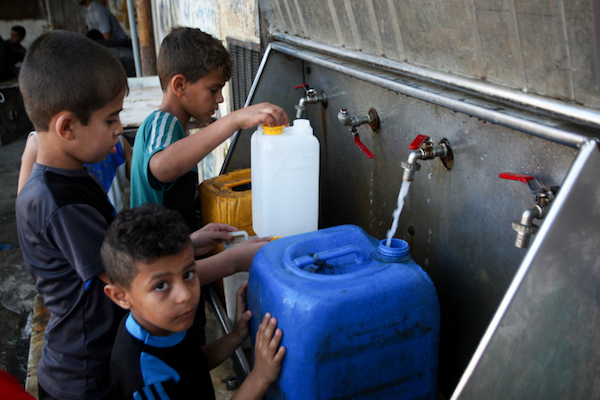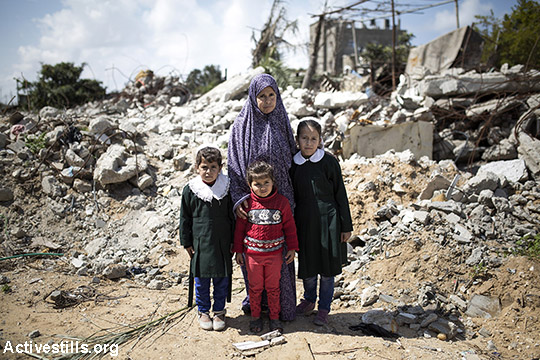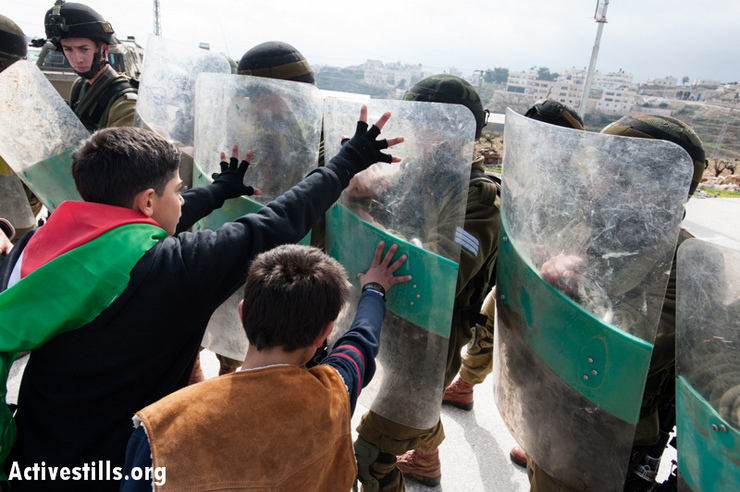A first-of-its-kind bill introduced this week focusing on the rights of Palestinian children could pave the way for greater transparency and accountability in America’s dealings with Israel.

Members of Congress on Tuesday introduced a bill requiring the U.S. Secretary of State to certify that funds bound for Israel “do not support military detention, interrogation, abuse, or ill-treatment of Palestinian children.” The proposed legislation, put forward by Minnesota Representative Betty McCollum, had ten co-sponsors when it was announced.
Although that number may seem small, especially when measured against the 268 current co-sponsors of the so-called Israel Anti-Boycott Act, the “Ending Israeli Military Detention of Palestinian Children Act” is further evidence that the Palestinian rights movement in the U.S. is gaining unprecedented ground.
“As the first-ever bill on Palestinian human rights introduced in Congress, we see [this] as a direct challenge to the systemic impunity enjoyed by Israeli forces,” said Brad Parker, an attorney with Defense for Children International-Palestine, which has been working to support McCollum and other members of Congress through its No Way to Treat a Child campaign.
According to a statement issued yesterday by DCI-Palestine, in the West Bank alone, some 10,000 Palestinian children — defined as those between the ages of 12 and 17 — have been “subject to arrest, detention, interrogation, and/or imprisonment under the jurisdiction of Israeli military courts since 2000.” And during Israel’s 2014 war on Gaza, 535 Palestinian children were killed “as a direct result of Israeli attacks,” according to a report posted on the organization’s website.

That all of this has done little to moderate Congressional exuberance over Israel’s policies is no secret. But behind the scenes, a group of activists has been patiently engaging with members willing to question the status quo on Israel. McCollum is one of those members.
Her bill caps a three-year advocacy campaign, spearheaded by DCI-Palestine and the American Friends Service Committee, to expose Israeli abuses against Palestinian children. Although the proposed legislation stands little chance of passing into law, Jennifer Bing, program director of AFSC’s Palestine Israel Program, says the effort behind it has helped build awareness on Capitol Hill about Palestinian rights.
“Three years ago, when we started this campaign with DCI-Palestine, few people in Congress knew about the systematic detention of Palestinian children in the Israeli military court system,” says Bing. “Today we have ten champions in Congress who are speaking up for the rights of Palestinian children and asking for accountability. We expect more to join them and for the issue to gain momentum as our efforts continue.”
There are signs that some in Congress may be slowly adopting a more even-handed approach toward the Palestine issue. In September, several U.S. lawmakers, including former presidential candidate Bernie Sanders, met with Issa Amro, a nonviolent human rights defender from the West Bank. And in June, 32 members of Congress, through a letter to the State Department, sought to pressure Israel into dropping military court charges against Amro.
“It’s about time that Congress begin taking action that puts the microscope on Israel’s abusive behavior,” said Yousef Munayyer, executive director of the US Campaign for Palestinian Rights. Munayyer added that, despite official U.S. support for Israel, “many Americans, including in the halls of Congress, believe Palestinian children deserve a childhood.” McCollum’s legislation, he said, “helps send that message.”

McCollum has long been a progressive voice on the Palestinian issue. In 2015, she was among 19 members of Congress who co-signed a letter to then-Secretary of State John Kerry, calling on the Obama administration to “elevate the human rights of Palestinian children.” The call came a year after Israeli forces had killed 14-year-old Orwah Hammad and brutally beat 15-year-old Tareq Abu Khdeir, both Palestinian-American. (The latter incident was reported by the New York Times, citing video evidence obtained by +972.)
At the same time, McCollum has faced harsh criticism for opposing repeated Congressional attempts to halt all but “security” aid to the Palestinian Authority, a prospect that she has said “likely diminishes the diplomatic tools needed to advance U.S. policy goals” in the region. The latest of these attempts, known as the Taylor Force Act, reportedly has 28 co-sponsors in the Senate while its companion bill in the House of Representatives has 143. The latter is slated for “mark up” by the Committee on Foreign Affairs this week, and observers say the review could mean a vote in the full House is near.
For now, Palestinian advocates remain hopeful. Although more legislators have lined up behind the Taylor Force Act, Parker, of DCI-Palestine, says McCollum’s bill has a different purpose.
“The bill leaves current financial assistance amounts to the government of Israel in place,” Parker noted. Instead, its focus is “on prohibiting funds from supporting widespread and systematic human rights violations.”

The call for certification draws on the Leahy Law, which prohibits assistance “to any unit of the security forces of a foreign country” if the U.S. Secretary of State has “credible information that such unit has committed a gross violation of human rights.” By insisting that the Secretary of State certify how U.S. aid to Israel is being used, the McCollum bill pushes for “accountability through transparency,” Parker said.
Munayer agrees: “I think that all Americans can agree that they deserve to know how their tax dollars are being used, particularly if there’s a clear record of their hard-earned dollars going to support the abuse of children’s rights.”
“This is a very welcome step toward transparency and accountability for Israel’s behavior toward Palestinians.”

